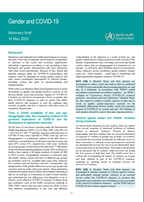
Improving women’s health and gender justice since the 1995 Beijing Platform for Action
In the last 25 years, WHO has made progress on several aspects of women’s rights, health and gender equality as laid out in the visionary global policy framework from 1995, the Beijing Platform for Action on Women.
Advances have been made in recognizing the importance of women as healthcare providers and leaders in global health; reducing maternal mortality worldwide and barriers women face in accessing quality health services; and improving understanding of how risk factors for communicable and noncommunicable diseases affect women differently. The development of medical abortion methods has also contributed to a reduction in the number of unsafe abortions, saving thousands of women’s lives. Advocating for women’s voices, WHO’s work takes into account women’s values and preferences in addition to clinical considerations. These advances are also contributing to advancing the 17 interconnected Sustainable Development Goals.
Supporting feminist movements to hold governments accountable and drive change in communities while applying a human rights-based approach is essential to continue advancing the health and well-being of women everywhere, in all their diversity.
Challenges remain and new ones continue to arise. Women often face multiple forms of discrimination and marginalization, visible in pay gaps, especially in the health workforce; the prevalence of violence against women and gender-based violence, including harassment; and limited access to opportunities such as education, employment and decision-making. Women of specific ethnic origins, women living with disabilities, trans women and migrant women face specific and unique challenges and marginalization impacting their health and wellbeing. Meaningful investment in, political commitment to and prioritization of urgent issues affecting women, their health, leadership and gender justice – like gender equality, reproductive health and violence against women – are still lacking.
In 2021, WHO will be leading the Action Coalition on Gender-based violence ahead of the Generation Equality Forum in Paris to recommit to the Beijing Platform for Action.
Almost 70% of health workers are women
Yet only an estimated 25% of leadership roles in health are held by women.
Health systems will be stronger when women have an equal say in the design of national health plans, policies and systems. Learn more
1 in 3 women
experience physical and/or sexual violence, mostly at the hands of an intimate partner.
This number has remained largely unchanged over the past decade. Learn more
94% of all maternal deaths
occur in low and lower middle-income countries.
Most of these deaths could have been prevented. Learn more
45%
of all abortions are unsafe.
Safe abortions protect women and girls' health and human rights. Learn more
Transgender people
experience violence, legal barriers, stigma and discrimination.
WHO works with partners to address barriers which impact on access to health servicers by transgender people. Learn more
News
Spotlight

6 Priorities for women and health
Highlight

Podcast series: Women's health and gender equalities
A mother receives an updated records book for her 6 months old daughter after being vaccinated at the community clinic.
Publications
All →
Violence Against Women Prevalence Estimates, 2018
This report is based on an analysis of available prevalence data from surveys and studies conducted between 2000 and 2018, obtained through a systematic...

Gender and COVID-19: Advocacy brief
Pandemics and outbreaks have differential impacts on women and men. From risk of exposure and biological susceptibility to infection to the social and...

Delivered by women, led by men: A gender and equity analysis of the global health and social workforce...
The report, produced by the WHO Global Health Workforce Network’s Gender Equity Hub, co chaired by WHO, and Women in Global Health, is the latest...





